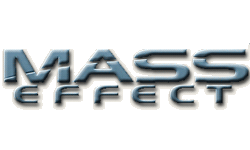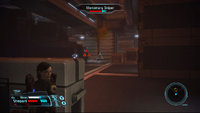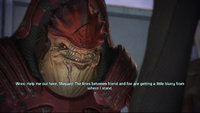|
|

|
PLATFORM
|
Xbox 360
|
BATTLE SYSTEM
|

|
INTERACTION
|

|
ORIGINALITY
|

|
STORY
|

|
MUSIC & SOUND
|

|
VISUALS
|

|
CHALLENGE
|
Adjustable
|
COMPLETION TIME
|
15-40 Hours
|
|
OVERALL

|
Click here for scoring definitions
|
|
|
North American RPGs are something of a rarity when compared to the constant barrage of titles from the land of the rising sun, but Canadian developer Bioware has dedicated itself to the genre and has gained a nearly legendary status among the RPG community. With hit titles under their belts such as Neverwinter Nights and Knights of the Old Republic, whenever they decide to make a game, people take notice. Bioware's latest endeavor, Mass Effect, is no exception, and has been the topic of so much hype over the past year that living up to it would seem a virtually impossible task. While Mass Effect is far from a perfect game, with a number of major flaws and gameplay oddities that will likely turn away some long-time fans of the company, it nonetheless comes together into a truly impressive experience.
In Mass Effect, the player takes on the role of Commander Shepard, a Systems Alliance marine whose appearance, personality, expertise, and even gender are entirely customizable. Acting as the Executive Officer on board the Normandy, Shepard comes into contact with a beacon left behind by an ancient space-faring civilization that died out 50,000 years ago. The beacon floods Shepard's mind with strange, incomprehensible images, and after an ally is murdered, he finds himself on the hunt for a rogue agent of Special Tactics and Reconnaissance, better known as Spectre. As the story unfolds, Shepard meets new allies and uncovers ancient evils that could undo the entire galaxy. There are many twists and turns throughout the plot, and there are several surprises that will unquestionably shock the player.
While the story is well-crafted, it is the method of storytelling that deserves most of the praise. Mass Effect is a prime example of true interactive storytelling, as Shepard never says anything without input from the player, which generally consists of several options. These options form one of the key gameplay elements, and the choices made affecting the direction of the dialogue and can even mean the difference between a peaceful resolution and a bloody firefight. To top it off, every single piece of dialogue within the game is voiced without exception, a feat made all the more impressive when considering the different potential branchings of each conversation along with two separate voice actors (one male and one female) for the main character.
The universe of Mass Effect is another area in which the writers outdid themselves. The universe is immense and extremely detailed. While the main story of the game will only take the player through just over a half dozen planets, a myriad of separate planetary systems have been crafted, with even unvisitable planets containing brief summaries of their composition and colonization history. There are also several planets on which Shepard can land and explore, and the game's numerous sidequests will often lead to these places. Every race present in the game has a detailed history which often plays a role in the story itself, and the game's timeline literally goes back over 50,000 years.
Unfortunately, a few aspects of the universe are particularly hokey, and are quite often almost carbon-copies of elements introduced in other science fiction series. The Geth, for instance, are essentially the Borg or the machines from the Terminator movies. The Rachni are the same as the Zerg of Starcraft fame, the Systems Alliance can be equated to Star Trek's Federation, and even the game's namesake, the mass effect relays, are larger-scale versions of stargates. Despite these small bits of unoriginality, the whole thing manages to come together into something unique.
 Duck and cover!
Duck and cover!
|
|
In much the same way, Mass Effect's combat system is both original and uninspired at the same time. For all intents and purposes, the game is actually a third-person shooter. Shepard is outfitted with four different types of firearms: pistols, shotguns, assault rifles, and sniper rifles, and the player is responsible for aiming and firing in real time from a behind-the-shoulder perspective while managing a squad of AI controlled allies. Make no mistake, however; Mass Effect is indeed an RPG. All kills and even most non-combat tasks and missions award experience points which increases the squad's level, allowing each character to distribute talent points to learn new skills and improve known ones. While the most basic elements of a shooter are there, they differ enough to allow even the most awkward gamers enjoy it.
For starters, aiming Shepard's weapons just feels right. The aiming reticle moves at just the right speed to keep it accurate without sacrificing too much speed. Either way, the player doesn't need to be terribly accurate with their aiming, as the game has a hefty auto-adjusting system that allows the target to be struck so long as the reticle is in the general area. If that weren't enough, the game also plays out more as a tactical shooter a la Gears of War rather than the tried and true twitch shooters fans of that genre are used to. The game encourages the player to seek shelter and attack from a tactical vantage point rather than just rush in, though it's entirely possible to build a character capable of doing just that. By pressing up against a flat surface, Shepard will put his back to it, and by moving closer to the edge of that surface the viewpoint will shift to the side, providing the opportunity to line up a shot before leaving cover and to retreat to it quickly should the need arise. Finally, the game forgoes any form of ammo management, opting instead for an overheating system, whereby weapons will become temporarily useless if fired for prolonged periods of time.
While the basics of combat are done extremely well and are thoroughly enjoyable, the game's skill system is another matter entirely. Lacking a mana system, all skills in Mass Effect instead have cooldowns before they can be used again, limiting their use and reinforcing weapons as the primary method of dealing damage. To make matters worse, the interface for choosing skills to use is horrendous, requiring the player to hold the right bumper, move the left analog stick to select a skill, and then press A to activate it before releasing the bumper. The game does provide a hotkey system, but since there is only one hotkey button, it further limits its use. Thankfully, by playing a combat class and bringing allies along that know the various special skills, one can enjoy their effects while focusing on the excellent tactical combat rather than fumbling with obtuse menus. There are also periods of vehicle combat which are brutally frustrating. The vehicle itself bounces around like it weighs almost nothing, regardless of the supposed gravity level on the planet, and its weapon systems are inaccurate and awkward to use.
The skills interface isn't the only place where Mass Effect fails. Virtually all menus in the game are cumbersome to work with. In particular, selecting and selling equipment can be a major hassle. Whenever an item is sold or destroyed, the menu returns to the top, which makes selectively choosing which equipment to sell and destroy a frustrating experience. On top of that, while the game does a good job of showing which items are upgrades and which are downgrades, it only shows that information for characters currently in your squad, ignoring the ones who are sitting on the sidelines. Since the party can only be changed while onboard the ship, this makes shopping a rather frustrating experience and is even worse when purchasing from the Normandy's supply officer. The party is nonexistent while on the ship, allowing you to only see Shepard's stats and no one else's.
Mass Effect redeems these problems, however, with its tremendous artistic quality, both visually and aurally. As mentioned previously, every piece of dialogue within the game is fully voiced, and generally voiced quite well, though some parts falter slightly. In particular, Seth Green's (yes, the Seth Green) portrayal of "Joker," the Normandy's pilot, is spot on. In addition, the score is simply incredible. It manages to be both subtle, slipping into the background and providing a terrific ambiance, while at the same time jumping out with impressive, fully orchestrated pieces during climactic moments, both in combat and in cutscenes. The score feels like it's on the same level as a Hollywood blockbuster and provides the same tone throughout the game, providing a very cinematic experience.
 A face only a mother could love.
A face only a mother could love.
|
|
The visual aspects of the game aid to this cinematic presence, as cutscenes generally involve dramatic camera angles and effect sequences, complete with motion blur effects. Even combat can provide a cinematic experience as Shepard and his allies sprint through crossfire to find cover. The visuals themselves are extremely detailed and surprisingly varied for a science fiction piece. Facial expressions in particular are extremely impressive, although the faces of some characters, and the hair of all characters, just don't look as realistic as they could. The hair, in fact, looks downright ugly.
Sadly, this artistic beauty comes at a price, and that price is loading times. They are frequent, lengthy, and extremely grating. In addition, there are occasional framerate dips in certain areas that can interrupt the flow of the game. While these technical issues are irritating, they fail to detract from the game in any meaningful way.
Mass Effect's biggest failure, however, is simply the length of time necessary for completion. For a Bioware game, or in fact any console RPG, Mass Effect is frustratingly short, with a main story that can be completed in as little as fifteen hours. Thankfully it offers up a wealth of optional content which can easily double or even triple the playtime, and with six playable classes and the ability to restart a new campaign with the same character upon completion, the potential for multiple playthroughs is enormous. The fact that there are several ways to go through most key conversations only adds to this, not to mention the fact that choosing different squad members for a particular mission can allow the player to experience different pieces of dialogue.
Mass Effect also offers up a decent challenge to gamers of all skill levels, with enemies scaling to the player's level and several difficulty settings being available that can be adjusted at any time. While the normal difficulty setting is likely well-balanced for most players, an easier difficulty as well as several harder difficulties are available. All in all, Mass Effect manages to be a great, thoroughly enjoyable game, but Bioware still has several kinks to work out before this trilogy wraps itself up.
Review Archives
|









